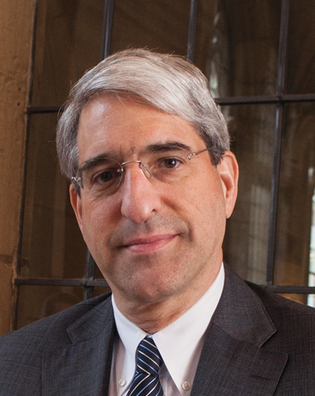 loading
loading
Q&A: Peter SaloveySexual misconduct and fairnessThe Yale Alumni Magazine regularly holds a conversation with Yale president Peter Salovey ’86PhD to provide a forum in which alumni can learn his views. (This interview was conducted by e-mail.) In this issue, Salovey answers questions about Yale’s process for handling charges of sexual misconduct on campus and about recent complaints of inequity at the School of Medicine. (For more on the latter, see “Med School under Fire over Gender Issues.”)  Mark OstowView full imageY: Yale, like many universities, has a system for sexual misconduct complaints that lets complainants keep their cases confidential. But the potential for leaks can leave an accused hung out to dry in the press, unable to offer a defense because s/he has promised confidentiality—as has happened in some cases at Yale. Do you see a problem here? S: I want a Yale campus that is a safe and respectful environment for everyone. The expectation of confidentiality in our university disciplinary procedures is intended to protect the parties involved, as well as to ensure the integrity of the process to allow the full participation of complainants, respondents, witnesses, and panel members. It is a mistake to assume that leaks can be devastating only to a respondent (or “an accused”): we have reason to believe that lack of confidentiality can have a chilling effect on complainants as well, and can prevent individuals who have been harmed from coming forward. I am concerned that we have found ourselves in situations recently where individuals have used the media to tell their versions of a story. Arguing significant and sensitive events in the press can be damaging to both parties and may well deter future complaints. Moreover, the institution is prevented, because of its commitment to confidentiality (and in some cases, its legal obligations), from providing additional information or setting the record straight. I do not have a solution to this complex issue except to trust that participants in the process will honor our expectations of confidentiality. We do try to provide a measure of transparency to our confidential processes: the semiannual reports published by the university Title IX coordinator and posted to a website are intended to apprise the community of all the complaints that come to our attention and how we address them, including the penalties imposed. Y: Some charge that universities’ sexual misconduct complaint processes are unfair because they don’t require a standard of proof or defendants’ rights comparable to those in legal proceedings. How does Yale’s process address this? S: Yale must have model programs for preventing and adjudicating sexual misconduct that are evaluated regularly and refined as needed. We are mindful that sexual misconduct cases considered for university discipline are not criminal proceedings. The standard of proof that the federal government requires in these cases is a “preponderance of the evidence.” This is the same standard required in noncriminal legal actions. I also want to stress that pursuing a complaint through Yale’s sexual misconduct disciplinary processes does not preclude pursuing civil or criminal legal options. With respect to the rights of both complainant and respondent in our internal sexual misconduct disciplinary proceedings, both are entitled to an adviser, who may be an attorney; to participate in a hearing by a panel of the University-Wide Committee on Sexual Misconduct (UWC); to submit written statements in response to the UWC panel’s report and recommendations; and to appeal the final decision. We have incorporated additional due-process elements, as well, including the use of an independent fact finder in formal complaints. I should also say that I hope for a time that has less to do with handing down disciplinary decisions from the UWC and more to do with how Yale as a community develops positive norms with respect to culture and behavior. The peer Communication and Consent Educators in Yale College, for example, have done a remarkable job in resetting the conversations on sexual misconduct to focus on positive practices and long-term culture change. And the Title IX representatives assigned to each school work closely with the university Title IX coordinator to facilitate broad conversation among faculty, staff, and students about appropriate and respectful conduct. Y: The recent sexual harassment charge at the medical school brought up wider complaints of an unfriendly environment for women at the school. For instance, a pay equity study finished nine months ago has not been released. The school has convened a task force about these issues. What would you like to see the task force accomplish? S: I am committed to a workplace environment for all Yale faculty—women and men—that supports excellence in research, education, and practice. I have met with groups of faculty members as well as the faculty task force and made it very clear that I, along with the provost and the dean of the medical school, will address their recommendations. The charge to the task force is to offer recommendations regarding the advancement of women faculty, opportunities for leadership, and other aspects of the work environment, including climate and compensation. I have complete confidence in the ability and commitment of the task force to identify the appropriate issues and make meaningful recommendations for the school’s future.
The comment period has expired.
|
|